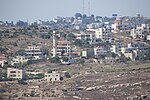Abwein
Ramallah and al-Bireh GovernorateThrone villagesVillages in the West Bank

Abwein (Arabic: عبوين) is a Palestinian village in the Ramallah and al-Bireh Governorate of the State of Palestine, located about 37 kilometers north of Ramallah, in the northern West Bank. According to the Palestinian Central Bureau of Statistics, Abwein's population was 3,496 in 2017.Abwein's main agricultural products are olives, figs, grapes, apples, peaches, pears, and vegetables. There are three schools in the town with about 1,200 students and about 200 students are enrolled in various Palestinian universities. Abwein also has three mosques, the largest of which is the Farouk Mosque.
Excerpt from the Wikipedia article Abwein (License: CC BY-SA 3.0, Authors, Images).Abwein
Abwein,
Geographical coordinates (GPS) Address Nearby Places Show on map
Geographical coordinates (GPS)
| Latitude | Longitude |
|---|---|
| N 32.0325 ° | E 35.199166666667 ° |
Address
Abwein Post Office
Abwein
Palestinian Territories
Open on Google Maps









